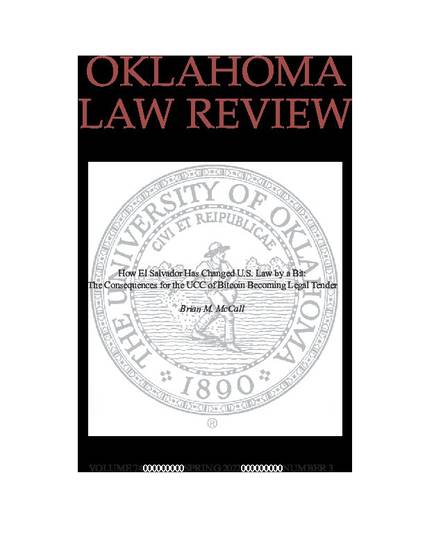
Article
How El Salvador Has Changed U.S. Law by a Bit: The Consequences for the UCC of Bitcoin Becoming Legal Tender
University of Oklahoma Law Review
(2022)
Abstract
On June 8, 2021, the Congress of El Salvador passed a law that changed American commercial law.How could a foreign country change U.S. law? El Salvador’s Congress voted to confer “legal tender” status upon the cryptocurrency Bitcoin.The law took effect in El Salvador on September 7, 2021;starting that day, Bitcoin could be used to pay taxes4 and buy goods and services in El Salvador. As the first country to adopt Bitcoin as legal tender, El Salvador made world history and sparked many debates and predictions about the effects its decision may have on the Central American nation and its economy.Beyond such consequences, El Salvador has, wittingly or unwittingly, changed the legal effects of various provisions in the Uniform Commercial Code. As a result of the UCC’s particular definition of money,7 designating Bitcoin as legal tender has wrought changes throughout the commercial law of all U.S. states that have adopted the UCC. This Article explores some of the consequences wrought by El Salvador’s bold action. Part I explains the nature and history of Bitcoin and summarizes the forms in which people can own the cryptocurrency. Part II then catalogues the major consequences for the UCC of Bitcoin becoming legal tender in El Salvador. Finally, the Article reaches some conclusions about what actions the Uniform Laws Commission should propose in response to this development.
The article is also available at https://digitalcommons.law.ou.edu/olr/vol74/iss3/3/
Keywords
- Bitcoin,
- Uniform Commercial Code,
- Money,
- El Salvador,
- Security Interest,
- Bank,
- Deposit Account,
- securities account,
- Legal Tender
Disciplines
Publication Date
Spring May, 2022
Citation Information
Brian M McCall. "How El Salvador Has Changed U.S. Law by a Bit: The Consequences for the UCC of Bitcoin Becoming Legal Tender" University of Oklahoma Law Review Vol. 74 Iss. 3 (2022) p. 313 - 335 Available at: http://works.bepress.com/brian_mccall/45/
Creative Commons license

This work is licensed under a Creative Commons CC_BY International License.
